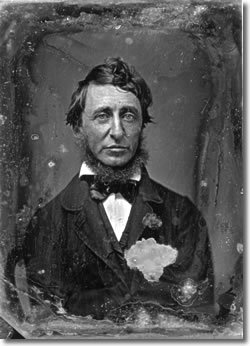The Journal of Henry David Thoreau
Henry David Thoreau
 Henry David Thoreau (1817–1862) was an author, naturalist, transcendentalist philosopher, social critic, tax protestor, and prominent abolitionist in mid-nineteenth-century America. He is best known for two books: Walden, his rumination on simple living in nature, and Civil Disobedience, his passionate argument for individual nonviolent resistance to injustice by civil authority. Thoreau’s nature writings anticipated two pillars of modern day environmentalism—ecological philosophy and environmental history—and his philosophy of nonviolent resistance profoundly influenced the actions of later figures, including Mohandas Gandhi, Martin Luther King, Jr., and César Chávez.
Henry David Thoreau (1817–1862) was an author, naturalist, transcendentalist philosopher, social critic, tax protestor, and prominent abolitionist in mid-nineteenth-century America. He is best known for two books: Walden, his rumination on simple living in nature, and Civil Disobedience, his passionate argument for individual nonviolent resistance to injustice by civil authority. Thoreau’s nature writings anticipated two pillars of modern day environmentalism—ecological philosophy and environmental history—and his philosophy of nonviolent resistance profoundly influenced the actions of later figures, including Mohandas Gandhi, Martin Luther King, Jr., and César Chávez.
Although Thoreau never visited the Sierra Nevada, he was well aware of the enormous cultural transformation unleashed by the California Gold Rush. In 1852, he commented, in his journal, on the social and environmental impact of the event.
 Play the selection
Play the selection
Read by Daniel DeFoe, Professor of History, Sierra College
